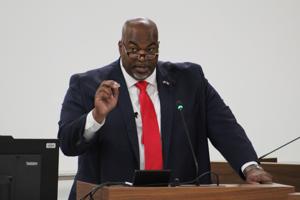Senate committee advances bill barring critical race theory in North Carolina schools

(The Center Square) – A North Carolina Senate committee has advanced a bill that would prohibit K-12 schools from promoting certain ideologies about racism and discrimination.
The legislation stems from a partisan disagreement over critical race theory, which is centered around the idea that race is a social construct used to oppress people of color. The theory, developed by legal scholars in the late 1970s and 1980s, concludes racism in America is systemic.
The theory gained new notoriety in response to the 1619 Project, a New York Times multimedia piece that connects slavery to capitalism.
The Senate Committee on Education/Higher Education gave House Bill 324 a favorable vote Tuesday.
Backers of the bill said the theory and liberal ideologies are being “indoctrinated” at public schools. Lt. Gov. Mark Robinson, a strong proponent of the measure, launched a task force to examine indoctrination in the state’s schools. He released a report Tuesday, ahead of the committee hearing, with 506 statements from teachers and parents alleging incidents of indoctrination in schools.
“What this is is an attempt to stop the abuse of the teaching profession by few who are using that profession to put undue pressure on young minds to accept their way of thinking,” Robinson said.
The names and information of the parents and teachers making the claims were redacted from Robinson’s report. Robinson said the report is evidence indoctrination is taking place in schools.
One teacher said he or she was required to complete professional training on implicit racism. A parent said his or her child was required to write a paper on police brutality against “certain races.” The parent also said the student remained mute during virtual classes because she was told to “back down” after speaking against the teacher’s views on equality. Others also said their children were taught that Black people are oppressed and white people are privileged.
“My child’s freshman history class was told that if ‘you were white and Christian, you should be ashamed.’ My child’s junior history class was told that ‘it is possible that some Republicans could be good people,’ ” a parent wrote.
The current version of House Bill 324 lists 13 concepts educators will be banned from promoting in public schools.
The legislation prohibits schools from teaching race superiority and that people and the country are inherently racist or sexist. It blocks schools from teaching students to stereotype others as morally corrupt or prejudice based on their skin color or sex.
The measure also stops schools from making students “feel guilt or anguish” because of their race, sex or actions of others in the past. It blocks schools from encouraging the idea that America was created by a certain subgroup to oppress others and bars schools from promoting overthrowing the U.S. government and that the rule of law does not exist.
School districts would be required to provide at least 30 days notice to the North Carolina Department of Public Instruction and the public before teaching or holding discussions on the listed concepts. They also must provide notice to the department if they invite a speaker or trainer to schools that have spoken about the concepts in the past.
The North Carolina House approved its version of HB 324, 66-40, on May 15. The proposal came after Charlotte-Mecklenburg Schools assigned a book that suggests society is passively racist as summer reading for students.
Democrats on the Senate Committee on Education/Higher Education said even though the report provides evidence of impartiality, it does not provide solid evidence of indoctrination. Sen. Jay Chaudhuri, D-Wake, said there are other avenues for parents to address the issues.
“If there are concerns about a book that is being taught that is inappropriate, almost all school board policies allow for the parent to object from them,” Chaudhuri said. “If there are concerns about the way the teacher is teaching, the State Board of Education has adopted a professional code of conduct, in which a teacher must abide by that.”
The measure now must be reviewed by the Committee on Rules and Operations of the Senate before a full Senate vote.
Disclaimer: This content is distributed by The Center Square
